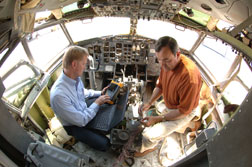NEWS RELEASES
FOR IMMEDIATE RELEASE
June 21, 2007
Sandia invention for making airplanes safer wins key award from Federal Lab Consortium
Other inventions also receive awards
 Larry Schneider (left) and Mike Dinallo use the PASD diagnostic on a cockpit wiring bundle in a retired Boeing 737 at a Sandia FAA test center.
(Photo
by Randy Montoya)
Larry Schneider (left) and Mike Dinallo use the PASD diagnostic on a cockpit wiring bundle in a retired Boeing 737 at a Sandia FAA test center.
(Photo
by Randy Montoya)Download 300dpi JPEG image, “sparkfind-cockpit.jpg,” 628K (Media are welcome to download/publish this image with related news stories.)
A Sandia research team was the nation’s only winner of the 2007 Federal Laboratory Consortium’s (FLC) Interagency Partnership Award for Excellence in transferring federal technology to the commercial marketplace.
Larry Schneider, R. Kevin Howard, Steve Glover, and Michael Dinallo won from a pool of more than 250 research facilities for their team’s work in creating PASD (Pulse Arrested Spark Discharge) — a commercially viable technique that sends a very brief high-voltage spark along the spaghetti-like wiring in airplane fuselages. The energetic but harmless spark jumps to ground or other wires when it crosses barely noticeable breaks in insulation, creating momentary short circuits whose locations can be traced and the damaged wiring repaired or replaced.
The technique was developed largely through a partnership with the Federal Aviation Agency. The technique, proven after years of testing and development at Sandia, was transferred last year to the private sector.
Sandia is a National Nuclear Security Administration laboratory.
Wrote DOE Secretary of Energy Samuel Bodman, “PASD is the world’s first wiring diagnostic tool that can detect and locate a broad range of aircraft defects, such as breached insulation, chafing, and small insulation cracks, and because of this detection will save lives.”
Says Schneider, “The final step was finding the right commercial partner. Astronics Advanced Electronics Systems recognized PASD’s capabilities and then brought to bear their significant expertise to field a system within months. PASD’s first use in a National Transportation Safety Board accident investigation yielded exceptional results. ArcSafe® (the commercial name for PASD and other test technology) is just now being marketed, but its future looks bright.”
The award recognized Sandia’s work with a federal agency to transfer technology to the marketplace that helps prevent catastrophic airplane in-flight failures resulting from short circuits in electrical wiring.
The FLC is a 34-year-old loosely linked network of federal laboratories that provides a forum in which to develop strategies for linking laboratory technologies to the commercial marketplace.
Sandia also had three winners in the more populated but still selective “Award for Excellence in Technology Transfer” category.
Craig Smith and Ernest Friedman-Hill were winners for “Jess ® — the Rule Engine for the Java™ — Platform.” The program is a tool for building intelligent software that can be repeatedly applied as an expert system to difficult or ill-defined systems when rote computation won’t do. It has been applied to problems in technology, insurance, and financial services, as well as in academic artificial intelligence research, and has been licensed to hundreds of academic institutions.
Nathan Golden, Tom Anderson, Bill Camp (ret.), Art Hale, and Mark Allen won for Novint’s 3-D haptic technology software that adds an interactive virtual touch capability to human-computer interactions. Among the uses are medical applications, remote vehicle or robotic control, military applications, and video games. Users are said to feel realistic weight, shape, texture, dimension, dynamics, and force effects.
An improved solar design won an award for David King, Paul Smith, James Gee, Mark Allen, and Jeffrey Nelson. The breakthrough photovoltaic cell design and fabrication process for Albuquerque-based Advent Solar, Inc., moves current-carrying electrical circuits from the front surface of the cell, where they unavoidably block sunlight, to the back surface where the backside wiring carries the current away. The advance — which uses a laser to drill holes through the silicon substrate and form conductive channels from front to rear surfaces — is said to lower costs by eliminating the front-to-back assembly. And the design is aesthetically pleasing, a quality not often mentioned in connection with Sandia advances.
Sandia is a multiprogram laboratory operated by Sandia Corporation, a Lockheed Martin company, for the U.S. Department of Energy’s National Nuclear Security Administration. Sandia has major R&D responsibilities in national security, energy and environmental technologies, and economic competitiveness.
Sandia news media contact: Neal Singer, nsinger@sandia.gov, (505) 845-7078